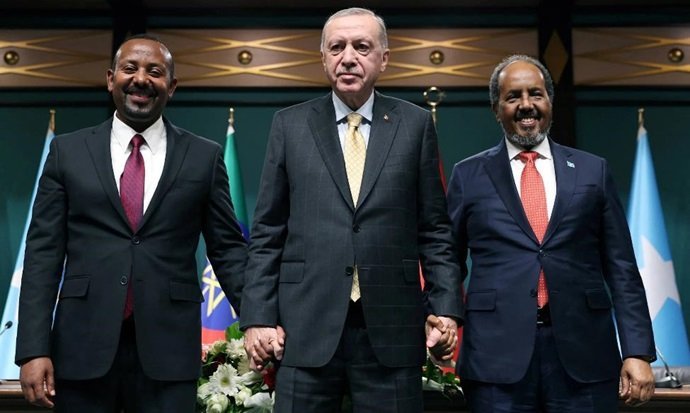By Bashir M. Sheikh-Ali, J.D
The Ankara Declaration, signed between Somalia and Ethiopia with facilitation from Turkey, represents a significant step in diplomatic relations but carries complex legal and sovereignty implications. While the document emphasizes mutual respect for sovereignty, territorial integrity, and a cooperative spirit, its consequences could impact Somalia’s maritime rights and its obligations under international law, particularly the United Nations Convention on the Law of the Sea (UNCLOS). The declaration’s provisions merit careful scrutiny to understand its legal and geopolitical effects.

At its core, the declaration sets a framework for technical negotiations between Somalia and Ethiopia to finalize commercial arrangements, including Ethiopia’s access to and from the sea. This assurance, while framed under Somalia’s sovereign authority, introduces ambiguities that must be addressed to prevent unintended erosion of Somalia’s control over its maritime domain. Under UNCLOS, Somalia retains full sovereignty over its territorial waters and exclusive rights over its Exclusive Economic Zone. These rights include control over navigation, resource exploitation, and regulation within these zones. The declaration’s language does not explicitly challenge these rights but leaves open questions about how Ethiopia’s access will be implemented without infringing on Somalia’s legal entitlements.
One critical aspect of the declaration is its non-binding nature, which provides flexibility for Somalia to safeguard its interests during negotiations. However, the proposed technical negotiations could lead to binding agreements that may alter the current maritime arrangement. Somalia must ensure that any future agreements explicitly affirm its sovereignty and regulatory authority over maritime zones. Ethiopia’s access should be limited to specific, mutually agreed purposes, such as trade or logistical support, without extending to military or strategic activities that could undermine Somalia’s sovereignty. Retaining full Somali oversight over port infrastructure and maritime operations is essential to maintaining control.
The declaration also subtly infers the possibility of a broader Ethiopian presence in Somalia. The phrase “secure and sustainable access to and from the sea” could potentially be interpreted to include not just maritime use but also the establishment of logistical or operational hubs within Somalia. However, Somalia should explicitly clarify that this term applies solely to the security of goods in transit and does not extend beyond that scope.
While the declaration frames this access within Somali sovereignty, Ethiopia’s stated ambitions for reliable maritime routes might lead Ethiopia’s demand for a more tangible control over Somali ports or transport corridors. Somalia should retain strict control of its resources. Without strict limitations, such arrangements could evolve into longer-term dependencies or strategic leverage, which would require careful management to avoid encroachments on Somali sovereignty.
Additionally, the declaration acknowledges the sacrifices made by Ethiopian soldiers in African Union missions in Somalia. This reference highlights Ethiopia’s historical and ongoing military involvement in Somalia, which has often been framed as a stabilizing force but also suggests Ethiopia’s deeper strategic interests in the region. Ethiopia’s desire to play a central role in regional security frameworks, such as the African Union’s AUSSOM (African Union Transition Mission in Somalia), aligns with its broader geopolitical ambitions. While these actions are framed as cooperative, they could also serve as leverage for Ethiopia to solidify its presence and influence in Somalia, potentially extending beyond security matters to economic and logistical domains. Somalia must carefully assess the implications of Ethiopia’s dual role as both a security partner and a potential competitor for economic influence within its territory and the region.
Another legal consideration is the status of the Memorandum of Understanding (MOU) on maritime delimitation. If the MOU remains valid, it provides a framework for addressing maritime boundary issues albeit contentiously. However, the Ankara Declaration does not reference the MOU directly, leaving its relevance uncertain. This ambiguity underscores the importance of Somalia clearly defining the relationship between the declaration and existing legal instruments to avoid conflicts or overlaps.
The declaration also raises broader concerns about Somalia’s territorial integrity and the potential for external influence. Ethiopia’s assurances of secure and sustainable access to the sea must be implemented in a manner that respects Somalia’s sovereignty and minimizes risks of dependency or strategic encroachment. Historical precedents show that poorly defined agreements on access can lead to long-term disputes or erosion of sovereign control. Somalia must adopt a cautious approach, ensuring that any arrangements are time-bound, reciprocal, and subject to periodic review to protect its interests.
In addition to legal implications, the declaration has geopolitical consequences. Ethiopia’s reliance on Somalia for sea access underscores its strategic and economic vulnerabilities as a landlocked country. While cooperation could foster mutual economic benefits, it also introduces potential power dynamics that Somalia must manage carefully. Involving international organizations such as the African Union or IGAD in negotiations could enhance transparency and provide a neutral platform for resolving disputes. Multilateral engagement would also align the process with regional frameworks, ensuring consistency with broader African Union principles on sovereignty and territorial integrity.
To safeguard its sovereignty and align with UNCLOS, Somalia should adopt a comprehensive strategy during the negotiation phase. This strategy should include clear legal safeguards to affirm Somalia’s maritime rights, effective monitoring mechanisms to oversee implementation, and multilateral involvement to balance power dynamics.
While the Ankara Declaration promotes cooperation and mutual respect, its implications for Somalia’s maritime sovereignty, security, and international obligations must be carefully managed. By prioritizing legal clarity, strict oversight, and balanced negotiations, Somalia can ensure that the declaration’s outcomes align with its national interests and uphold its sovereignty. The status quo, as established prior to the MOU, should remain the baseline unless explicitly altered by new agreements, providing Somalia with a firm foundation to assert its rights and protect its maritime domain.
Bashir Ali, Ph.D., J.D.
Email: bsali@yahoo.com
_____
Ali is an international trade lawyer
____________
Related articles:
1. Inside the turkey-backed somalia-ethiopia deal By Ragip Soylu
2. Africa File Special Edition: Ankara Declaration Reduces Ethiopia-Somalia By Institute for the study of war

Leave a Reply